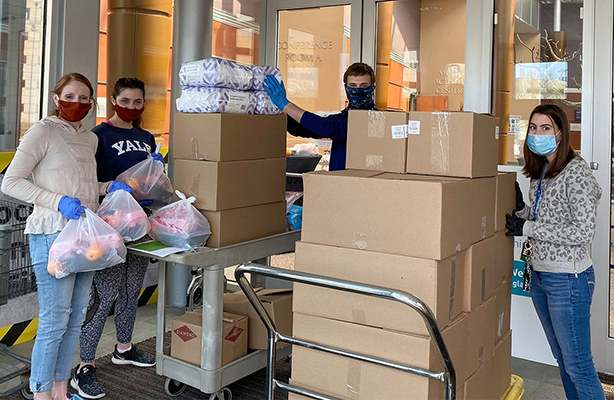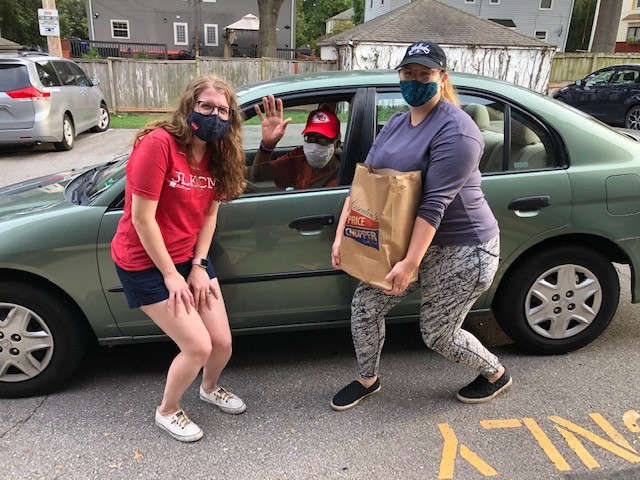Jewish Family Services of Greater Kansas City has significantly expanded its services during the COVID-19 pandemic, including its food pantry, social work support, Care Navigation Line, mental health and education, and Jewish life services, among others.
The expanded services coincide with JFS’ 120th anniversary in December. JFS was founded in 1901 when five volunteer agencies joined to legally incorporate as United Jewish Charities, according to the JFS website (jfskc.org). It was founded on the Jewish value of tikkun olam (repairing the world). The organization changed its name to Jewish Family Services in 2006.
JFS Executive Director and CEO Don Goldman said the pandemic “really has changed everything” about the organization’s mindset and methods for providing services to the Kansas City area’s Jewish and broader populations.
Before March 2020, JFS offered its services through close contact with recipients to build relationships, Goldman said. Greeting people when they entered its offices, chatting and getting to know them was the staff’s tradition.
But the pandemic made close contact with clients impossible for a time, so management and staff had to think of new ways to provide services. These included talking with clients through their car windows, by phone and by Zoom for telehealth services, and starting drive-up pantry services. To help provide its expanded services, JFS added 18 employees, bringing the total to about 60, and started relying on technology “in a much greater way than we did before,” Goldman said.
JFS eased back toward normalcy when it reopened its offices in July. Starting in May, it required its staff and frontline volunteers to get fully vaccinated by July 1, and it started implementing safety protocols. The coronavirus Delta variant’s appearance caused JFS “to backtrack a few steps,” but it will continue to provide many of the expanded services even after the pandemic wanes, Goldman said.

“I don’t think we’ll ever come back to the office completely,” Goldman said. “It’ll be hybrid with virtual and we’re figuring that out now.”
Toward that end, JFS’s mental health therapists provide in-person and virtual counseling. In-person counseling has value because “it’s easier to see the whole person,” Goldman said, but many clients prefer telehealth for some sessions because of its greater speed and efficiency.
“Even if they have childcare issues or they’re not feeling well, they can still have their session, whereas before they would have had to cancel,” Goldman said. “So, all the changes we made will persist and will now become part of our tool set. The pace hasn’t slowed.”
While expanding its services during the pandemic, JFS has faced problems navigating its clients’ needs. The economy is improving and more people are returning to work despite an ongoing labor shortage, but JFS serves many clients still struggling to find jobs, Goldman said. Strained mental health, child care difficulties and job training problems contribute to that struggle. Some people are emerging from the pandemic with “huge debt.”
“There should be all these federal programs to alleviate it, but there have been problems with implementation,” he said. “Many people are still left behind and challenged, more than pre-COVID. I hope it gets better soon, but even after COVID these problems will remain.”
In addressing the problems and needs of its clients, JFS collaborates with other organizations, including KC Care Clinic, KC Medicine Cabinet, Jewish Vocational Service and Jackson County CASA (Court Appointed Special Advocates). KC Care Clinic set up vaccine clinics to provide vaccinations for JFS’ clients. KC Medicine Cabinet helps clients get medicines.
JFS has received awards for its efforts to serve the Kansas City area. Among them, Jackson County CASA gave JFS and the Robinson family the Light of Hope Award in April for their roles in a program that has helped hundreds of abused and neglected children stay in their foster homes to avoid the trauma of being moved. Nonprofit Connect recently nominated JFS for consideration for its NP Connect Award based on JFS’ expanded services during the pandemic.

JFS relies on its volunteers to help implement its expanded services. Goldman said he had recently talked with a longtime food pantry volunteer who said he missed seeing clients in person. Goldman hopes more people will volunteer with JFS in the coming year; those interested in doing so can visit jfskc.org.
After 120 years, caring remains the heart of the missions and importance of JFS to the Kansas City area, Goldman said.
“I think (JFS is) vital because we are a really caring community, and I think it’s important for both our missions — for the Jewish community but also [to] go beyond that and help everyone in need that we’re able to,” he said. “Our country has a weaker social safety net than I think we would all like. I hope the Jewish community is proud that we’re out there representing the Jewish community as part of the overall safety net.”
KCPT’s “Week in Review” host Nick Haines recently interviewed Goldman, JFS Board President Kelly Somberg, clients, staff and volunteers to update progress at JFS. Visit jfskc.org/friends2021 to watch the video.
2020 Gratitude Report
People served: More than 10,000
Funding: Nearly $6.9 million
Top four funding sources: grants, $2.33 million; COVID-19 funding, $1.34 million; philanthropic giving, $967,000; in-kind pantry donations, $942,000
KesherKC:
- Food pantry: 99% increase from 2019 in families served (1,511 from 759); 73% increase in amount of food distributed (277.6 tons from 160.6 tons); 1,709 people received food at community events; 1 in 3 families received pet food
- Social work support: 872 clients served, up 122% from 393 in 2019; 72% of clients enrolled in two or more programs; 745 people received $878,374 in financial aid
- Volunteers: 324 contributed nearly 6,600 hours, equal to nearly $179,450 staffing value
- Care Navigation Line: 2,567 calls for assistance
Mental health and education: Nearly 4,250 counseling sessions, up 50% from nearly 2,825 in 2019; 369 clients served; 16 schools participated in the YouBeYou teen mental health program; 3,280 participants in Family Life Education/CHAI programs
Older adults: 424 care management clients, up 55% from 274 in 2019; 177 Help@Home members and 1,964 visits; 308 Calling Connections clients; 101 people received Medicare counseling; $2,805 average Medicare savings per person counseled, for total savings of $790,409
Jewish life: 512 people received chaplaincy and spiritual care in 1,964 visits; 4 babies born to families assisted by Priya; 160 families received Passover and High Holiday food; 357 Hannukah project recipients
JFS’ two locations: JFS at The J, 5801 W. 115th St., Suite 103, Overland Park, KS 66211; 913-327-8250; and JFS Brookside East, 425 E. 63rd St., Kansas City, MO 64110; 816-333-1172.




